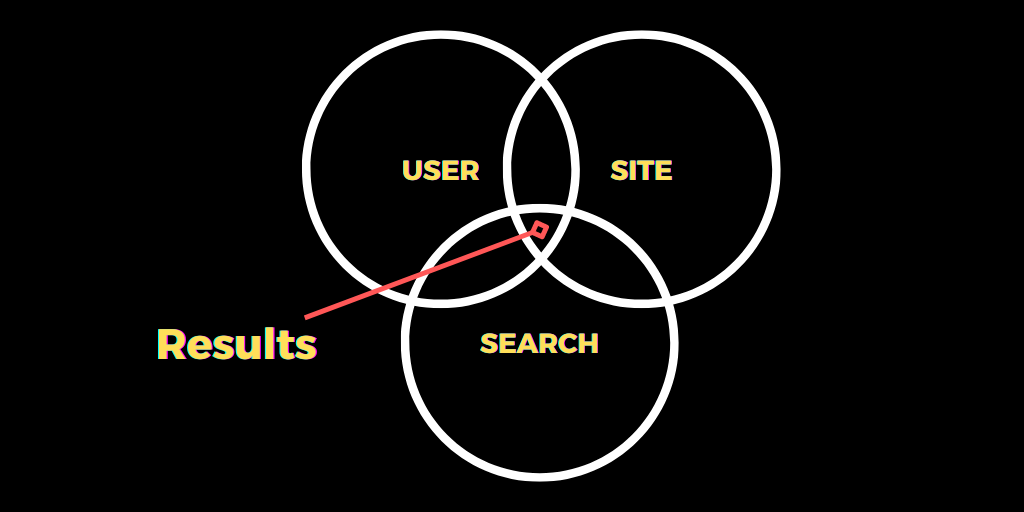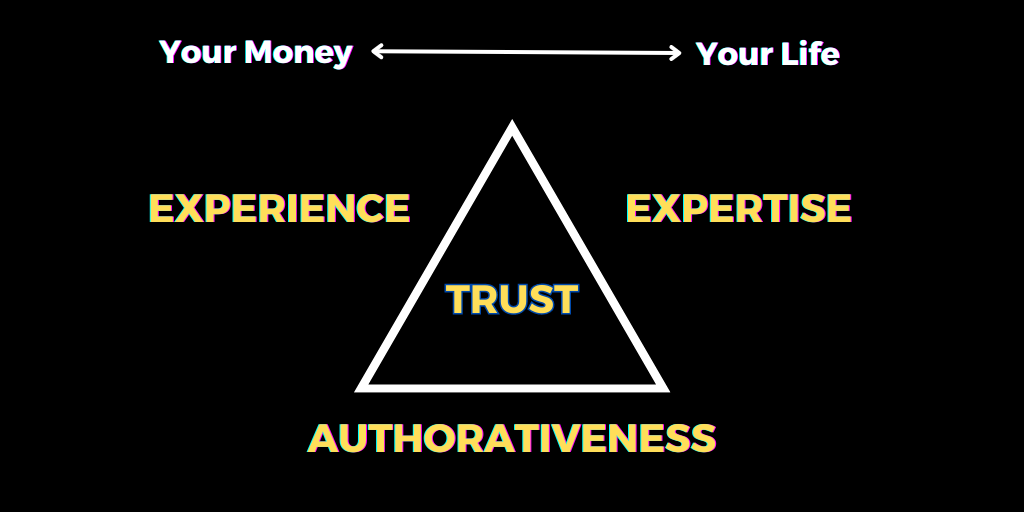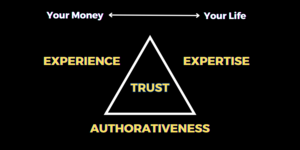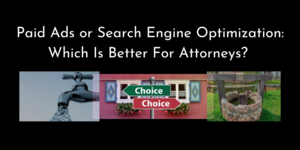What are EEAT and YMYL?
EEAT is Google’s updated metric gauging the relative value of content and materials published on websites. It is measured in relation to the four pillars of the acronym (Experience, Expertise, Authoritativeness, and Trust). Both EEAT and YMYL are important topics for attorneys influencing SEO and Search Engine Rankings for your Legal Websites.
YMYL is a related acronym meaning Your-Money-Your-Life which is another metric specifically of interest within topical categories like law, medicine, and personal finance.
Your law firm’s SEO strategies should consider how actions can positively (or negatively) affect your measures and the impact that can have on your traffic.
How Do Search Engines Work?
To understand how EEAT affects SEO strategy, you must understand search engines’ fundamental objective (ex. Google, Bing, etc.).
Search Engines exist to satisfy User queries. For those experienced enough to remember going to libraries and using a “Card Catalog”, search engines perform a similar function to a much simpler and easier exercise.

Consider this image that highlights the three main components of this relationship.
- Users ask questions and have interests.
- Websites publish information about topics.
- Search Engines use algorithms that catalog information and evaluate intent.
Keep this in mind.
- Users have interests in a multitude of topics.
- Websites publish information about those things they know and do.
- Only some of your information might be of topical interest right now to a user.
- The search engine seeks to align those situations.
The search engine’s intended purpose is to quickly provide the best option that will satisfy the intent of the user.
Bluntly, if your legal website best addresses the needs, concerns, and questions of the audience you want to reach, it will rank!
EEAT and YMYL are just factors that influence how well websites rank (especially for attorneys).
How it affects Law Firm SEO Strategy?
The components of EEAT help objectively measure the likelihood that your content will accurately satisfy the intent.
They include the following.
Experience
Experience is a newly-added consideration when evaluating websites and their content. It represents a mechanical measure of things you have done or conclusions you have drawn.
Experience is less sharing information already available or retelling the stories of others, but more so those things that you, your website, and/or your law firm have said or done.
Editor’s Note:
Measuring and evaluating experience is a direct reaction from many search engines to the proliferation of AI/ML (artificial intelligence and machine learning) tools that are rising in general public use.
While not the subject of this post, suffice it to say that search engines value content produced by humans for human consumption because that is the best experience for their users.
By introducing the measurement of Experience, search engines are seeking to more highly value real human-to-human interactions. Since AI tools (ex. ChatGPT, Bard, etc.) have no personal human experiences, they can only provide answers based on the information they collate.
Keep this in mind as you evaluate the inclusion of these tools within your law firm’s SEO and Content strategy.
Expertise
Expertise is what you know.
As a Bankruptcy Attorney, your skills and understanding are likely not related to medical or aviation-related topics.
While you may have understanding in those areas, your area of expertise is within the legal arena.
Editor’s Note:
Similarly, it is equally likely that, if you are a Bankruptcy Attorney, your greatest knowledge and skill are within that niche area.
Too many attorneys and law firms fill their websites with an assorted list of specialties and focus areas.
Unless you are willing to invest the time and resources to structure your website and develop the needed content to display expertise across multiple specialities, it is often better to primarily focus on a subset (or maybe one) at least initially.
Authority
Authority is your standing among others who might be speaking within the same legal space.
- Where do you and your law firm rank within the service classifications that you provide?
- If someone in your community seeks advice or an opinion within your area of focus, are you first, last, or somewhere in the middle on the list of whom they would ask?
Authority represents your standing among others within a topical area.
Trustworthiness
Trustworthiness is a measure of your believability concerning the topic.
Your legal website has to be a place where users receive valuable information and not an online brochure for your law firm’s services.
While your site is a marketing tool for your firm and should communicate what services you provide, trustworthiness speaks to your focus on satisfying users’ objectives (along with meeting your own).
Editor’s Note:
This is an area of caution for legal websites. Because of the high impact legal topics can have on users (see following section – YMYL), doing “spammy” or “salesy” things is the quickest way to cause harm and negatively impact your traffic (and overall reputation).
There are lots of “quick/easy tips and tricks to increase your traffic and rankings”. Many of them ultimately damage your ability to rank and generate organic traffic. Those that “work for now” probably will not over time because search engine algorithms will be adjusted to account for them.
Focus on providing value to your audience; skip the shortcuts!
Where does YMYL fit in the legal niche?
YMYL means “Your Money Your Life” and is an identifier for pages that “could potentially impact a person’s future happiness, health, financial stability, or safety”.
Pages and websites dealing with legal topics and issues clearly can affect people’s lives. As such, search engines hold law firm websites to a higher standard for accuracy and good practices.
When determining what content is governed under YMYL standards, it applies where:
- A viewer could be influenced or impacted.
- Someone else could be impacted based on actions taken by the viewer
- Other groups could be impacted by the viewer’s actions
Just keep in mind that legal websites viewed through the YMYL lens must exhibit the highest standards for EEAT.
Google, Bing, and other search engines treat websites very differently. There are different standards for an article on “How To File For Chapter 13 Bankruptcy” than a post detailing “The 7 Best Songs from 1987”.
EEAT and YMYL are just required considerations for attorneys and their law firm websites.
Editor’s Note:
All bias aside, it was Pour Some Sugar On Me By Def Leppard!
Optimization techniques that help your SEO
To optimize your Experience, Expertise, Authoritativeness, and Trustworthiness, build your strategy toward attorney search optimization around these six pillars.
Publish Valuable, Helpful Content
The material on your legal website needs to be helpful and topically relevant to your target audience. Keep in mind their objectives, needs, and goals before trying to meet your own.
Remember – search engines exist to satisfy the needs of their users (not your law firm’s marketing objectives).
Additionally, as algorithms evolve to identify and evaluate websites, original material written by humans for humans will continue to rank better and better.
Valuable and helpful content helps strengthen EEAT and YMYL for the attorney and firm publishing it.
Link To Credible Sources
When collating and referencing external information, be sure that you direct your users to reliable sources.
Much like the situation of a referral, your website’s reputation can be improved or harmed based upon whom you suggest users trust.
If you see questionable material or practices on a website that you would not follow on yours, the best recommendation is to avoid linking to them.
Get Linked To By Credible Sources
Similarly, a strong ranking factor for your legal website is the external links to your content.
Successful law firms develop a strategy for acquiring backlinks from other websites around (or above) their authority. Identify relevant connections that can be important associations within your target audience and local community.
Again, prioritize good link sources that elevate your brand and help promote others who follow your good practices.
Editor’s Note:
Keep in mind that websites and editorial strategies change over time. A site that is a good link partner (either from you or to you) could change in the future making it a much poorer choice.
Part of your strategy should be continually monitoring and evaluating your links.
When appropriate, do not hesitate to change a link (or remove one) if it no longer brings positive value to your law firm’s website.
Avoiding negative impact on your EEAT and YMYL measures are just as important for attorneys as improving them.
Optimize Your Brand
Your online brand (especially within the arena of Legal Local Search Engine Optimization) is extremely important!
Unlike many other businesses and industries, the legal niches are often locally focused. Your reputation within your local community is paramount.
Identify ways to get your law firm’s name and logo visible to your target audience.
Remember that one key to good branding is being present and participating where your clients (and prospects) congregate.
This applies to both online and “real life” situations.
Promote Positive User-Generated Content
Reviews (by your clients) are important to elevating your EEAT. Good user reviews signal to search engines that your firm provides value through your advice and services.
Where clients might go further to highlight what you have done, take those opportunities to promote that positive feedback.
These could include some of the following.
- Thank you cards sent to your firm
- Video clips highlighting something you did for them
- A post or mention of the benefit you provided
Since many of these types of content are published on highly-authoritative and widely-seen platforms (Facebook, X (formerly Twitter), Instagram, LinkedIn, etc), these can represent extremely valuable external links for your law firm’s website.
Highlight Your Authors
When trying to promote Authoritativeness and highlight your firm’s Experience and Expertise, do not overlook identifying and highlighting your content authors!
The connections within your community and history of providing service offer a strong ranking factor for your legal website.
Note: This is one reason that Guest Blogging on other associated/partner outlets helps elevate your site. Doing so tends to improve EEAT and YMYL measures for the attorney firm.
At a minimum, include their:
- Name
- Headshot
- Background
- Experience
- Short Bio
Again, one of the best identifiers of content by humans for humans is highlighting the humanity of the person who shared it!
2023 and beyond
If there is one important topic today that will continue to become more important as we move forward through 2023 and beyond, it is the rise of automation in legal search engine optimization and content development.
Automated tools improve on a near-daily basis. Likewise, the ability of algorithms to decipher human-written versus computer-generated content improves just as fast!
Your biggest strategic concern is determining how your legal website will utilize these tools.
Their speed and capability cannot be denied, but you must ensure that your content is hyper-focused on delivering user value. It truly is a situation where both quantity and quality are important considerations.
Pumping out hundreds of low-value articles will hinder growth and organic traffic just as much as inconsistent, unpredictable publishing. Likewise, few things will more quickly damage EEAT and YMYL ratings for attorneys and attorney websites than publishing generalized, automatically curated content that is incorrect or incomplete based upon local jurisdictions & legal standards.
Your strategy must identify how your firm will use the available tools to deliver the greatest value to your audience.
Wrap-up
EEAT and YMTL are important topics for attorneys and legal search optimization.
Be sure that your strategy promotes the Experience, Expertise, Authoritativeness, and Trustworthiness of your law firm and the attorneys who work in it.
Keep in mind how your law firm’s website can impact the lives and livelihoods of your audience. Make sure that you are highlighting your authority and ways your practice earns trust.
Finally, remember the fundamental objective of search engines and ensure that your legal website provides value satisfying the needs and objectives of your target audience.



